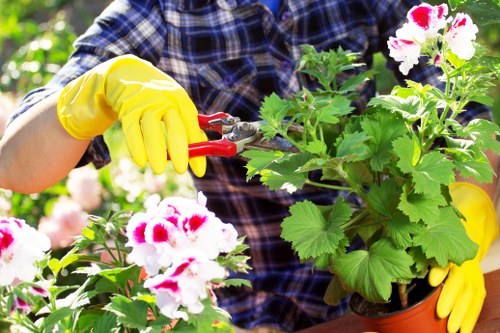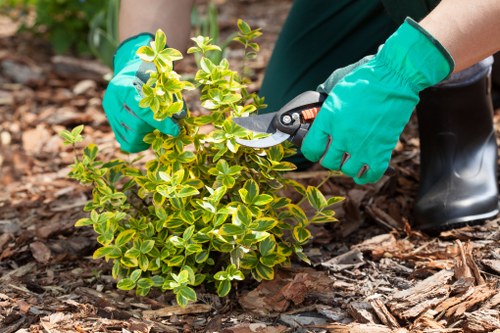Effective Oil Stain Removal for Driveways in South Hornchurch

Having oil stains on your driveway can be frustrating and unsightly. If you reside in South Hornchurch, you’re in luck. There are numerous ways to effectively remove these stubborn stains and restore your driveway to its original condition. This article will guide you through the best methods and solutions for oil stain removal driveway South Hornchurch residents can use.
Oil stains typically occur when vehicles leak oil onto the driveway surface. Over time, these stains can become permanent if not addressed promptly. However, with the right techniques and products, you can eliminate these blemishes efficiently.
Understanding the nature of oil stains is crucial before attempting any removal method. Oil penetrates the porous surfaces of driveways, including concrete, asphalt, and paving stones, making removal more challenging.
Causes of Oil Stains on Driveways

Oil stains on driveways are usually caused by vehicle leaks. Common culprits include:
- Engine Oil Leaks: From the engine or transmission.
- Brake Fluid: Spills from brake systems.
- Motor Oil: Excess oil from vehicle maintenance.
- Grease: From food trucks or machinery.
Other factors contributing to oil stains include the type of driveway material and the climate in South Hornchurch. Wet and cold conditions can make oil penetration deeper, complicating the removal process.
Prompt action is essential to prevent oil from setting into the driveway surface. The sooner you address the stain, the easier it will be to remove.
Why Removing Oil Stains is Important

Removing oil stains is not just about aesthetics. Here are some key reasons why it’s important:
- Aesthetic Appeal: Clean driveways enhance the overall look of your property.
- Property Value: Well-maintained driveways can increase your home's value.
- Safety: Oil stains can become slippery, posing a hazard to pedestrians.
- Prevents Damage: Oil can degrade driveway materials over time, leading to costly repairs.
By maintaining a clean driveway, you not only preserve the beauty of your home but also ensure safety and longevity of the driveway surface.
Top Methods for Oil Stain Removal

There are several effective methods for removing oil stains from driveways in South Hornchurch. Below are some of the most popular and proven techniques:
1. Absorbent Materials
Using absorbent materials is a simple and cost-effective way to tackle fresh oil stains. Products like cat litter, baking soda, or sawdust can help soak up excess oil.
Steps:
- Sprinkle the absorbent material generously over the oil stain.
- Allow it to sit for several hours or overnight to absorb the oil.
- Sweep up the material and dispose of it properly.
- Repeat if necessary for stubborn stains.
2. Pressure Washing
A pressure washer can effectively remove oil stains, especially on concrete driveways. The high-pressure water stream helps lift and remove the oil from the surface.
Steps:
- Apply a degreaser or detergent to the oil stain.
- Let it sit for 15-20 minutes to break down the oil.
- Use the pressure washer to scrub the area thoroughly.
- Rinse the driveway with clean water.
3. Commercial Oil Stain Removers
There are various commercial products specifically designed for oil stain removal. These products contain chemicals that break down and lift oil from driveway surfaces.
Steps:
- Choose a reputable oil stain remover suitable for your driveway material.
- Follow the manufacturer's instructions for application.
- Allow the product to work for the recommended time.
- Scrub the area with a stiff brush and rinse with water.
Natural and Eco-Friendly Solutions

If you prefer environmentally friendly methods, several natural solutions can effectively remove oil stains without harsh chemicals.
1. Vinegar and Baking Soda
A combination of vinegar and baking soda can break down and lift oil stains naturally.
Steps:
- Pour white vinegar directly onto the oil stain.
- Sprinkle baking soda over the vinegar-treated area.
- Let the mixture fizz and sit for 30 minutes.
- Scrub the area with a brush and rinse with water.
2. Lemon Juice
Lemon juice acts as a natural degreaser. Its acidic properties help break down oil stains effectively.
Steps:
- Apply fresh lemon juice to the oil stain.
- Allow it to sit in the sun for a few hours to enhance the cleaning process.
- Scrub the stain with a brush and rinse thoroughly.
3. Cornmeal
Cornmeal can absorb oil and help lift stains from driveway surfaces.
Steps:
- Sprinkle a thick layer of cornmeal over the stain.
- Let it sit for several hours to absorb the oil.
- Sweep up the cornmeal and clean the area with water.
Preventing Future Oil Stains
Preventing oil stains is easier than removing them. Here are some tips to keep your driveway clean:
1. Regular Maintenance
Regularly inspect and maintain your driveway to catch leaks early. Prompt repairs can prevent oil from seeping into the driveway surface.
2. Use Oil Drip Pans
Place drip pans under your vehicle's engine to catch any leaking oil before it reaches the driveway.
3. Seal Your Driveway
Applying a sealant to your driveway can create a protective barrier against oil and other stains. This makes future cleaning easier and protects the surface from damage.
4. Prompt Cleanup
If you notice any oil spills, clean them immediately using absorbent materials to prevent them from setting in the driveway.
5. Professional Inspections
Have professionals inspect your vehicle regularly to ensure there are no leaks that could cause oil stains.
Choosing the Right Oil Stain Removal Service in South Hornchurch
While DIY methods can be effective, sometimes you may need professional assistance, especially for stubborn or large stains. Here’s what to consider when choosing a service:
1. Experience and Expertise
Select a company with extensive experience in oil stain removal. They should be familiar with various driveway materials and the best techniques to use.
2. Eco-Friendly Practices
Choose a service that uses environmentally friendly products and methods to minimize the impact on the surrounding area.
3. Customer Reviews and Reputation
Check customer reviews and testimonials to gauge the quality of the service. A reputable company will have positive feedback from satisfied customers.
4. Competitive Pricing
Compare prices from different providers to ensure you’re getting a fair deal. However, don’t compromise on quality for cost.
5. Comprehensive Services
Opt for a company that offers a range of services, including sealing and preventive measures, to ensure long-term protection for your driveway.
6. Local Knowledge
A local company will understand the specific challenges and requirements of driveways in South Hornchurch, ensuring more effective and tailored solutions.
Local Relevance: Nearby Areas to South Hornchurch
South Hornchurch is surrounded by several nearby areas, each with its unique characteristics and needs for oil stain removal driveway services. Here are some of the closest areas:
- Upminster: Just west of South Hornchurch, Upminster offers a mix of residential and commercial properties, often requiring effective oil stain removal solutions.
- Romford: North of South Hornchurch, Romford is a bustling town with lots of traffic, increasing the likelihood of oil stains on driveways.
- Hornchurch: Adjacent to South Hornchurch, Hornchurch features older homes with traditional driveway materials that may need specialized cleaning methods.
- Emerson Park: Southeast of South Hornchurch, Emerson Park has several cul-de-sacs and driveways where oil stains can be a common issue.
- Elm Park: Northeast of South Hornchurch, Elm Park residents often seek reliable driveway maintenance services to handle oil spills.
- Abbey: West of South Hornchurch, Abbey combines urban and suburban areas with diverse driveway surfaces requiring effective stain removal.
- Sturgeon Grove: Located southwest, Sturgeon Grove is known for its family homes where maintaining clean driveways is a priority.
- Burnt Mills: Northwest of South Hornchurch, Burnt Mills has tight-knit communities where word-of-mouth recommendations for oil stain removal services are common.
- Laughton Park: Southeast of South Hornchurch, Laughton Park residents often deal with driveway stains from multiple vehicles, necessitating regular cleaning services.
- Great Warley: Further east, Great Warley features larger properties with spacious driveways that require thorough oil stain removal techniques.
- Rainham: Northeast of South Hornchurch, Rainham has a mix of residential and industrial areas, increasing the presence of oil stains on driveways.
- Chadwell Heath: Southwest of South Hornchurch, Chadwell Heath has older infrastructure where driveway staining can be more persistent.
- Elmstead Market: Adjacent to South Hornchurch, Elmstead Market has a community that values maintaining clean and presentable driveways.
- Purfleet: Northwest of South Hornchurch, Purfleet's industrial background means oil stains are a common occurrence requiring effective removal solutions.
- Fobbing: Farther east, Fobbing has rural areas where driveways can be exposed to oil stains from farm machinery.
Choosing the Right Products for Oil Stain Removal
Selecting the appropriate products is essential for effective oil stain removal. Consider the following options:
1. Degreasers and Cleaners
Degreasers are formulated to break down oil and grease. Look for biodegradable options to minimize environmental impact.
2. Enzyme Cleaners
Enzyme-based cleaners use natural processes to digest oil stains, making them an eco-friendly choice.
3. Absorbent Powders
Products like baking soda, cornstarch, and commercial absorbent powders can effectively soak up fresh oil spills.
4. Sealants and Protectants
After oil stain removal, applying a sealant can protect your driveway from future spills and stains.
5. DIY Solutions
Natural ingredients like vinegar, baking soda, and lemon juice can be combined to create effective DIY cleaning solutions.
DIY vs. Professional Oil Stain Removal
Deciding between DIY methods and hiring professionals depends on several factors:
1. Severity of the Stain
For minor or fresh stains, DIY methods might suffice. However, for older or larger stains, professional services are recommended.
2. Driveway Material
Some driveway materials, like porous concrete, may require specialized cleaning techniques that professionals are better equipped to handle.
3. Time and Effort
DIY methods can be time-consuming and require physical effort. Professional services save you time and ensure a thorough clean.
4. Cost Considerations
While DIY methods are generally cheaper, professional services offer long-term benefits and often better results, making them a worthwhile investment for severe stains.
5. Environmental Impact
Professionals often use eco-friendly products and methods, minimizing environmental harm compared to some DIY chemical solutions.
Testimonials and Success Stories
Many South Hornchurch residents have successfully removed oil stains from their driveways using the methods discussed. Their positive experiences highlight the effectiveness of both DIY and professional approaches.
1. Quick DIY Solution
One resident used baking soda and vinegar to remove a recent oil spill. The solution worked perfectly, restoring the driveway's appearance within hours.
2. Professional Expertise
Another homeowner opted for a professional service after multiple DIY attempts. The professionals efficiently removed the persistent stains, and the driveway now looks brand new.
3. Eco-Friendly Approach
A family preferred using natural methods involving lemon juice and cornmeal. They were pleased with the eco-friendly approach that left their driveway clean without any harsh chemicals.
Maintenance Tips for a Stain-Free Driveway
Maintaining a clean driveway involves regular upkeep and preventive measures. Here are some tips:
1. Regular Cleaning
Sweep your driveway regularly to remove debris that can trap oil and make staining worse.
2. Prompt Spill Treatment
Address any oil spills immediately to prevent them from setting into the driveway surface.
3. Seal Your Driveway
Apply a high-quality sealant every few years to protect against oil penetration and other stains.
4. Use Protective Mats
Place mats or protective covers under your vehicle to catch any drips or leaks before they reach the driveway.
5. Monitor Vehicle Health
Regularly check your vehicle for any signs of leaks and address them promptly to prevent future stains.
6. Educate Household Members
Ensure that everyone in the household is aware of the importance of cleaning up spills immediately and using protective measures.
Conclusion
Oil stains on driveways can be a nuisance, but with the right approach, they can be effectively removed. Whether you choose DIY methods or professional services, ensuring a clean and well-maintained driveway enhances your property's appearance and safety.
Residents of South Hornchurch have access to a variety of solutions tailored to their specific needs, making it easier to tackle oil stains and prevent future occurrences. By following the tips and methods outlined in this article, you can maintain a pristine driveway and enjoy a beautiful, stain-free home environment.
Remember, proactive maintenance and timely action are key to preventing and removing oil stains. Invest in the right products and services to keep your driveway looking its best.
Frequently Asked Questions
1. How long does it take to remove an oil stain from a driveway?
The time required depends on the size and age of the stain. Fresh stains can be treated in a few hours, while older or more stubborn stains may take a few days with repeated treatments.
2. Can I use household cleaners to remove oil stains from my driveway?
Yes, household cleaners like baking soda, vinegar, and dish soap can be effective for removing minor oil stains. However, for larger or older stains, specialized products or professional services may be required.
3. Are there eco-friendly options for oil stain removal?
Absolutely. Natural solutions such as lemon juice, baking soda, and enzyme-based cleaners are effective and environmentally friendly options for oil stain removal.
4. How can I prevent oil stains from recurring on my driveway?
Regular maintenance, using protective mats, sealing your driveway, and promptly addressing any oil leaks from your vehicle are effective ways to prevent oil stains from recurring.
5. Should I seal my driveway after removing oil stains?
Yes, sealing your driveway after removing oil stains can provide a protective barrier that helps prevent future stains and makes cleaning easier.


